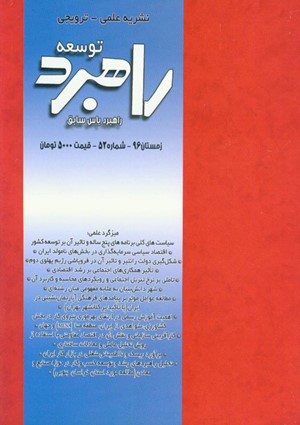اقتصاد سیاسی سرمایهگذاری در بخشهای نامولد ایران
محورهای موضوعی : Lawدکتر سیداحسان خاندوزی 1 , محسن فتح اله بياتي 2 , زهرا فاضل فرد 3
1 -
2 - تهران
3 - تهران
کلید واژه: اقتصاد ايران سرمايهگذاري اقتصاد سياسي گروههاي ذينفع, بخشهاي نامولّد,
چکیده مقاله :
توليدمحوري و انعطاف توليد در برابر تکانهها، شرط لازم براي مقاوم شدن اقتصاد ايران است. از سوي ديگر تحقق سرمايهگذاري در بخشهاي توليدي، بيش از متغيرهاي اقتصاد کلان، به اقتصاد سياسي ايران بستگي دارد. در بستر کنوني اقتصاد ايران، گروههاي ذينفع با رونق بخشيدن به بخشهاي نامولّد، مانع هدايت سرمايه به بخشهاي مولّد ميشوند، پديدههايي چون بيثباتي راهبرد توسعه صنعتي کشور، نقشآفريني گروههاي ذينفع در بخشهاي نامولّد و به کارنگرفتن ابزارهاي سياستي براي کاستن از بازده بخش غيرمولّد موجب نهادينه شدن اقتصاد سياسي بيمار در کشور شده است. در اين مقاله، تأثيرات اقتصاد سياسي در سرمايهگذاري به منظور تحقق اقتصاد مقاومتي بررسي و برخي راهبردهاي پيشنهادي براي برونرفت از وضعيت کنوني به منظور رونق پايدار سرمايهگذاري در بخشهاي مولّد، ارائه شده است.
The productiveness and flexibility of production against impulses is a prerequisite for the resilience of the Iranian economy. On the other hand, the realization of investment in manufacturing sectors depends more on the political economy of Iran than macroeconomic variable. In the current context of the Iranian economy, interest groups, by expanding the immortal sectors, impede the directing of capital to productive sectors. The phenomenon such as the instability of the industrial development strategy, the role of the interest groups in the immature sectors, and the failure to take policy tools to reduce the unproductive sector's returns has led to the institutionalization of the patient's political economy in the country. In this paper, the effects of political economy on investment in order to realize the strength of the economy are examined and some suggested strategies are proposed to exit from the current situation in order to boost investment in productive sectors
